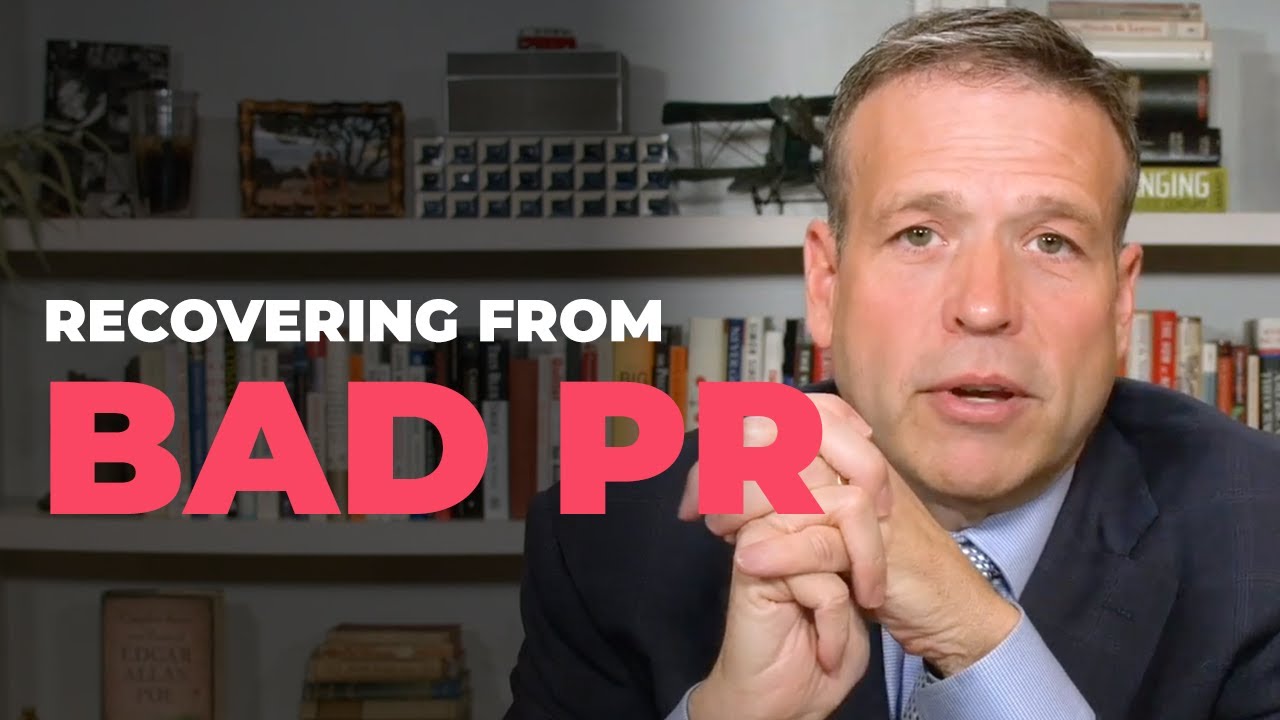Even if a firm accomplishes everything correctly, it may acquire unfavorable press at some point throughout its existence. That doesn't imply you should ignore it and hope it goes away if it happens to your organization.
This article will discuss what you can do to counteract the impacts of poor PR in order to limit unfavorable publicity and portray your company in a more positive way.

How to Recover From Bad PR
Understanding Bad PR
In business, negative PR or publicity may take several forms, involving unfavorable publicized material that can influence everything from a company's sales to its reputation.
Negative PR regarding your company might take several forms, including:
- Negative publicity about your firm in the news, on the internet, in newspapers, or on television
- Poor product or service evaluations on advisor sites and online forums
- Complaints and unfavorable remarks about your company on social media
Countering such unfavorable PR and exposure about your company is attempting to decrease and neutralize that negative information, which begins with your initial response.
Choosing The Best Response
When you receive unfavorable publicity, how you respond is critical to counteracting it. To begin, you should reply swiftly to help prevent any unwanted news from spreading further. Negative PR about your company can spread quickly, for example, through word of mouth or as more journalists cover a story, resulting in more bad press.
You may, however, affect how the story develops if you reply promptly and put together and disseminate a press release or statement, for example. It is critical to have a PR crisis plan in place to assist with this.
It's also crucial to remain cool and not overreact while responding. A hasty, unprepared reaction may end in you saying or doing anything that just offers the press more ammunition to continue broadcasting bad news articles about your company. It may also cause you to lose sight of other vital everyday businessconcerns that still need to be addressed.
It's also critical that you respond honestly and decisively. If your organization is to blame for any unfavorable PR, such as a product malfunction, it's best to address the problem, apologize, and explain what you're doing to make things right.
When questioned by the media, it is best not to answer 'no comment.' Journalists may just develop their own conclusions about the questions you are unable to address. If you are the CEO/MD of the company, you should also be prepared to do news interviews and answer stakeholder questions. This allows you to respond to queries calmly and sensibly while conveying the ideas you desire.
Crisis managementis a leadershiptest – it is critical that the most senior person in the organization is seen as the business's voice during a crisis, so as the CEO or MD, you should always be the frontline spokesperson facing media and stakeholder questions. Delegating this role to a less senior employee or an outside public relations representative would be a bad idea.
Developing Positive Company Messages
Another strategy for combating negative PR is to produce positive messages about your company. This may be as simple as attempting to generate as much good information about your company as possible, which may aid in the reduction of poor PR rankings on Google and social media. You could write articles about your company or industry, or you could put together press releases about positive news at your company to help divert attention away from the negative articles.
Consider messaging customers in response to negative comments, such as those on social media or review sites. Customers may not expect this, but they will respect you and your company for doing so and attempting to better understand an issue. When doing so, tread cautiously and consider what you should say to prevent exacerbating the situation. Other things that can help include preparing your personnel to provide good messages in your store, over the phone, or when networking.
You should strive to turn any unfavorable publicity into a chance to improve your company. Whether it's correcting production concerns, enhancing customer service, or expanding your product or service offering, you can generate and reinforce the message that, even in the worst of circumstances, your company is nice and respectable.
Final Thoughts
When it comes to dealing with unfavorable PR in business, there is a lot to consider, from how you respond to the messages you send about your brand. However, with the appropriate knowledge, guidance, and assistance, you can guarantee that your company is portrayed in the best possible light.
We can offer you the guidance and assistance you need to effectively address bad PRwith our specialist services in PR crisis management, so you can focus on what you do best – operating and building your business.
Is Bad PR Good?
A terrible public relations strategy may destroy a brand's image and reputation, putting it years behind in what would otherwise be progressive development and growth. Public relations initiatives may be detrimental to a brand's sales and severely hurt its bottom line.
What Is A Bad Example Of Public Relations?
Pepsi with Kendall Jenner commercial. The first example of terrible public relations is Pepsi's Kendall Jenner ad. Pepsi launched a commercial using Kendall Jenner, an American media personality and model, in 2017.

